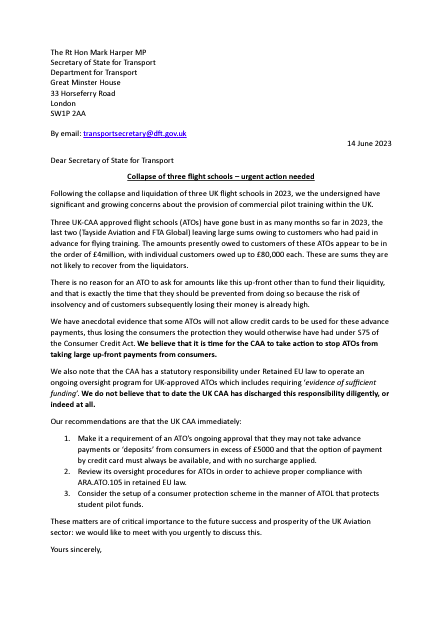In the wake of three UK flight school closures, representatives from the aviation industry have joined forces to demand stricter financial regulations for flight schools.
Their campaign aims to establish a stable pilot training pipeline and safeguard trainee pilots from significant financial losses. Earlier this year, students who had prepaid for flight training were left reeling after the collapse of Tayside Aviation and FTA Global. As a result, numerous trainees now face losses of up to £90,000, with little hope of recovering their funds from liquidators.

Signatories signed this open letter to the UK’s Secretary of State for Transport. Click to read (PDF opens in new window).
Under Retained EU law, the Civil Aviation Authority (CAA) holds a statutory responsibility to maintain an ongoing oversight program for UK-approved flight schools (ATOs), which includes ensuring “evidence of sufficient funding.” However, concerns have been raised regarding the CAA’s discharge of this responsibility.
The campaign by industry representatives urges the UK Civil Aviation Authority to take immediate action by:
1. Restricting Advance Payments: The ongoing approval of an ATO should mandate a maximum limit of £5,000 for advance payments or deposits from consumers. Additionally, flight schools must always offer the option of payment by credit card, without any surcharges. These measures aim to curtail financial risks for aspiring pilots.
2. Strengthening Oversight Procedures: A thorough review of oversight procedures for ATOs is essential to ensure full compliance with existing regulations.
3. Establishing a Consumer Protection Scheme: Consideration should be given to implementing a consumer protection scheme, similar to the Air Travel Organiser’s Licence (ATOL), to safeguard student pilot funds.
Miranda Rackley, Interim General Secretary of BALPA, emphasised the devastating financial impact flight school closures have on hardworking students. Miranda said, “Flight schools going bust is financially devastating to hardworking students who deserve to have their money better protected from flight school failures. Pilot
training is amongst the most expensive training of all professions, and unlike other careers such as law and medicine, there is no student funding available. Many trainees resort to family support to fund their training, such as remortgaging family houses.”
Rackley called on the government to take decisive action in protecting the interests of these vital future contributors to the UK aviation industry.
Alex Whittingham, Managing Director of Wings Alliance and Bristol Groundschool, criticised the CAA for its lack of attentiveness in overseeing flight schools. He stressed the need for immediate reforms to prevent similar incidents from recurring and jeopardising the financial well-being of aspiring pilots. “The CAA have been asleep at the wheel. They need to fix the system so this doesn’t happen again”.
The campaign serves as a wake-up call to the UK government, Department for Transport (DfT) and CAA, urging them to address the vulnerabilities within the pilot training sector. By implementing robust financial regulations and consumer protection mechanisms, the government can ensure the stability of the pilot training pipeline while safeguarding the future of the UK aviation industry.
Pilot Career News will closely monitor this campaign’s progress, providing regular updates as the drive for improved financial regulation and protection for trainee pilots unfolds.
